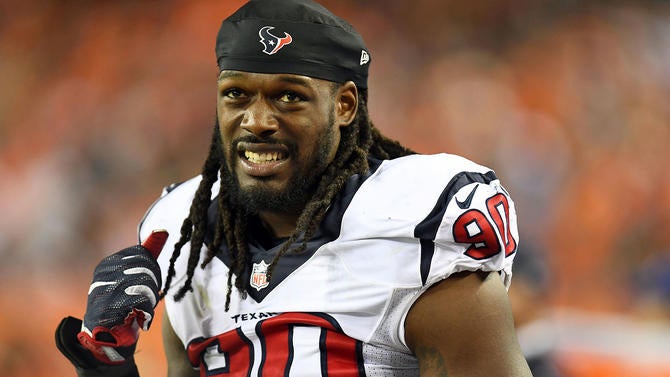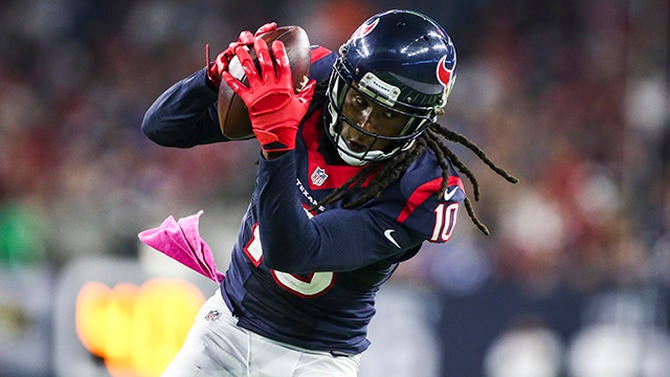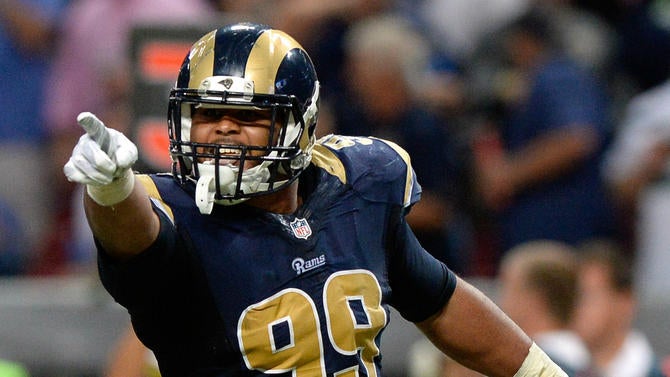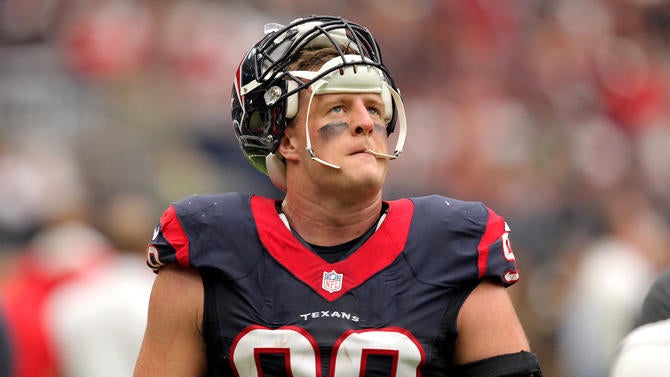- Joined
- Jun 28, 2010
- Messages
- 49,232
- Name
- Burger man

http://www.cbssports.com/nfl/news/a...solve-the-jadeveon-clowney-contract-quandary/
The Texans picked up Jadeveon Clowney's fifth-year option recently, comfortably ahead of the May 2 deadline. The option will pay Clowney, the top overall pick in the 2014 NFL Draft, $13.846 million in 2018 and is guaranteed for injury upon exercise. This fifth year becomes fully guaranteed early next March on the first day of the 2018 league year.
Clowney has answered critics that had been suggesting the Texans drafted the wrong edge rusher in 2014 with the first overall pick. Knee problems sidelined Clowney for 15 of the 32 regular-season games in his first two years and kept him out of Houston's playoff loss during the 2015 season. Meanwhile, Khalil Mack, the fifth overall pick, experienced immediate success with the Raiders. Healthy for the first time last season, Clowney was named to the Pro Bowl in 2016 and earned some first-team All-Pro/All-NFLhonors. He played a pivotal role in the Texans giving up the fewest yards in the NFL despite losing three-time Defensive Player of Year J.J. Watt to a back injury three games into the season.

Will the Texans negotiate with Jadeveon Clowney this offseason? USATSI
Clowney's stellar play in 2016 has put him in line for a contract extension either this offseason or next year before the start of the 2018 regular season. The Texans have a long-standing policy against negotiating contracts during the regular season. There are challenges the Texans will encounter regardless of whether Clowney is taken care of contractually sooner or later.
The Texans' pecking order for extensions
DeAndre Hopkins, the Texans' first-round pick in 2013, staged a one-day holdout when training camp opened last year protesting the Texans' refusal the negotiate an extension before his fourth year. Hopkins had a point: The Texans had negotiated with Watt and Whitney Mercilus, their first-round picks in 2011 and '12, before their fourth seasons. Watt's extension came in early September 2014 in the days leading up to the start of the regular season. Mercilus got his new deal in May 2015 at the deadline to pick up his fifth-year option.
Hopkins is entering his contract year. General manager Rick Smith indicated that the Texans intend to re-sign Hopkins when he addressed the media at the NFL combine in early March. A new deal for Hopkins isn't imminent.

DeAndre Hopkins wants to get paid. USATSI
The Texans run the risk of alienating Hopkins if Clowney is treated in the same manner as Watt and Mercilus before his own contract is extended. After expressing displeasure with his contract situation last offseason, Hopkins would likely view the Texans signing Clowney first as disrespectful and make him willing to test free agency in 2018. At the very least, the Texans should engage in meaningful contract discussions with Hopkins before turning their attention to Clowney. If the Texans were to reach an impasse with Hopkins, Clowney getting a new deal at this juncture should be less of an issue for the Pro Bowl wide receiver.
Clowney's contemporaries
Proactive NFL teams make a practice of extending the contracts of core players well in advance of free agency. Early extensions can allow teams to lock up very good to great players for a number of years at more affordable rates than if their contracts had expired.
Two fellow 2014 first-round picks that could receive extensions in the coming months might have an impact on Clowney's next contract. Aaron Donald should get a new deal in 2017 no later than the middle of September if the Rams adhere to the same timetable they did for first-round picks Tavon Austin, Michael Brockers and Robert Quinn.
Donald, the 2014 Defensive Rookie of the Year, has quickly become the NFL's most disruptive force from the interior of a defensive line. According to Pro Football Focus (PFF), his 82 quarterback pressures (combined sacks, quarterback hurries and quarterback hits) were the third most in the league last season and led NFL interior defensive lineman. Donald took the top spot in PFF's top 101 players for the 2015 season. He was second in PFF's 2016 rankings. A consensus first-team All-Pro the past two seasons, Donald has an excellent chance of becoming the NFL's first $20 million per year non-quarterback with at least $75 million in guarantees. That is if Mack doesn't beat him to it.

Aaron Donald will likely become the NFL's highest-paid interior defensive lineman. USATSI
A new Mack contract is unlikely to occur until quarterback Derek Carr signs an extension. Carr is a higher signing priority for the Raiders this offseason because he is entering his contract year. Mack is under contract through the 2018 season thanks to the option year. He became the first player in NFL history to earn first-team All-Pro honors at two different positions during the same season (defensive end and outside linebacker) in 2015. Mack followed up this outstanding campaign by being named the NFL's Defensive Player of the Year last season. If Donald gets a new deal first, his contract will serve as the salary floor for Mack.
Clowney's camp is likely to view new deals for Mack or Donald as relevant or important data points. The Texans probably won't consider Clowney as comparable because both players made an instant impact in the NFL as rookies and have continued to elevate their level of play. In order for it to become a more valid comparison, Clowney will need to erase durability concerns by duplicating or bettering his 2016 success during the upcoming season.
Internal salary consistency
A bigger concern for the Texans than any impact possible Donald or Mack deals might have on Clowney's eventual negotiations is maintaining internal salary consistency. Watt was the closest thing to a modern day Reggie White, who is arguably the greatest defensive football player of all-time, before his two back surgeries last year. If Watt is anything close to his previous form this season, he will be a shoo-in to win the NFL's Comeback Player of the Year award for 2017.
Watt has five years left on the six-year, $100 million contract extension he received before the 2014 season, which made him the NFL's highest-paid non-quarterback upon signing. He is a tremendous bargain financially with $67.5 million over the remaining five years of his contract, which runs through the 2021 season. Six defensive players have already surpassed Watt in the NFL's salary hierarchy. He will continue to drop as more players that can consistently put pressure on opposing quarterbacks, such as Donald and Mack, sign new contracts.

J.J. Watt is hoping to return to form this season. USATSI
Paying Clowney more than Watt will likely be problematic if the two-time NFL sack leader continues to be a dominant force. The Texans would need to adjust or renegotiate Watt's contract with multiple years remaining as well to avoid having a disgruntled franchise cornerstone.
A potential solution
The Texans should either reach an agreement on a new deal or impasse with Hopkins before offseason workouts end in mid-June to allow plenty of time to negotiate with Clowney, given their preseason deadline for new contracts. Getting Clowney to take a two-year extension that doesn't reach Watt's $16,666,667 average yearly salary and has less than the $50 million he is scheduled to make over the next four seasons (2017-20) should be seriously considered by the Texans.
A first-round pick receiving a two-year extension after the exercise of his fifth-year option isn't unprecedented. In 2015, the Patriots signed offensive tackle Nate Solder to a two-year, $20.062 million extension with $19.938 million fully guaranteed at signing. Solder also can't be designated as a franchise or transition player when his contract expires after the upcoming season.
A two-year extension for $32.5 million would pay Clowney slightly more than $49.8 million through the 2020 season. A $16.25 million new money average is $250,000 per year less than Cardinals franchise player Chandler Jones' recent five-year contract. Only Mack and Super Bowl 50 MVP Von Miller have more than Jones' 23.5 sacks during the last two seasons.
This type of deal would need to be front-loaded and a substantial amount of the $32.5 million of new money would need to be fully guaranteed at signing. For example, Clowney's 2017 compensation could be reduced to his $690,000 league minimum where he receives a $16.25 million signing bonus. He would be making close to $17 million in 2017 instead of slightly under the $3.5 million that's in his current rookie contract. Clowney's $13.846 million 2018 option year salary could be increased by a couple million and immediately become fully guaranteed rather than next March. The 2019 season would be either fully guaranteed at signing or convert from an injury guarantee to a full guarantee next March. He would receive no more than an unsecured or conditionally guaranteed $10 million in 2020, the final contract year. A tag prohibition clause shouldn't be given to Clowney.
Clowney would have to be comfortable with his contract not being comparable to the deals Donald and Mack are going to sign. The value of the two-year extension would likely be somewhere between $5 million and $10 million less than the compensation of the first two new years of a longer extension. He would hit the open market or get franchised in 2021 as a 28 year old anywhere from two to four years before Donald and Mack. Absent an extension in 2020, Clowney's third contract would come under a new collective bargaining agreement (CBA), which could be more favorable to players. The current CBA runs through the 2020 season.
Whether the Texans propose this concept or Clowney is receptive to it remains to be seen. I had a positive experience with a shorter-term extension for a Pro Bowl caliber player in the early 2000s while an agent.
The firm I worked for represented Dolphins cornerback Patrick Surtain. Sam Madison, who entered the NFL a year before Surtain, had previously signed a seven-year extension averaging $7 million per year in 2000. That was really good cornerback money considering the salary cap was $62.172 million.
During our negotiations of Surtain's extension the following year, we initially insisted that he should be the highest-paid cornerback on the team. This was a deal breaker for the Dolphins because they viewed Madison as slightly better at the time and a more accomplished player but also wanted seven new contract years as in his extension.
A good trade off to us was a much shorter extension allowing the Dolphins to maintain their cornerback salary hierarchy. We accepted a four-year extension at slightly under $7 million per year where Surtain's contract was set to expire two years before Madison's.
Surtain got another lucrative contract in a sign-and-trade to the Chiefsseveral days before the 2005 NFL Draft. The Dolphins contract was Madison's only big contract of his career.
The Texans picked up Jadeveon Clowney's fifth-year option recently, comfortably ahead of the May 2 deadline. The option will pay Clowney, the top overall pick in the 2014 NFL Draft, $13.846 million in 2018 and is guaranteed for injury upon exercise. This fifth year becomes fully guaranteed early next March on the first day of the 2018 league year.
Clowney has answered critics that had been suggesting the Texans drafted the wrong edge rusher in 2014 with the first overall pick. Knee problems sidelined Clowney for 15 of the 32 regular-season games in his first two years and kept him out of Houston's playoff loss during the 2015 season. Meanwhile, Khalil Mack, the fifth overall pick, experienced immediate success with the Raiders. Healthy for the first time last season, Clowney was named to the Pro Bowl in 2016 and earned some first-team All-Pro/All-NFLhonors. He played a pivotal role in the Texans giving up the fewest yards in the NFL despite losing three-time Defensive Player of Year J.J. Watt to a back injury three games into the season.

Will the Texans negotiate with Jadeveon Clowney this offseason? USATSI
Clowney's stellar play in 2016 has put him in line for a contract extension either this offseason or next year before the start of the 2018 regular season. The Texans have a long-standing policy against negotiating contracts during the regular season. There are challenges the Texans will encounter regardless of whether Clowney is taken care of contractually sooner or later.
The Texans' pecking order for extensions
DeAndre Hopkins, the Texans' first-round pick in 2013, staged a one-day holdout when training camp opened last year protesting the Texans' refusal the negotiate an extension before his fourth year. Hopkins had a point: The Texans had negotiated with Watt and Whitney Mercilus, their first-round picks in 2011 and '12, before their fourth seasons. Watt's extension came in early September 2014 in the days leading up to the start of the regular season. Mercilus got his new deal in May 2015 at the deadline to pick up his fifth-year option.
Hopkins is entering his contract year. General manager Rick Smith indicated that the Texans intend to re-sign Hopkins when he addressed the media at the NFL combine in early March. A new deal for Hopkins isn't imminent.

DeAndre Hopkins wants to get paid. USATSI
The Texans run the risk of alienating Hopkins if Clowney is treated in the same manner as Watt and Mercilus before his own contract is extended. After expressing displeasure with his contract situation last offseason, Hopkins would likely view the Texans signing Clowney first as disrespectful and make him willing to test free agency in 2018. At the very least, the Texans should engage in meaningful contract discussions with Hopkins before turning their attention to Clowney. If the Texans were to reach an impasse with Hopkins, Clowney getting a new deal at this juncture should be less of an issue for the Pro Bowl wide receiver.
Clowney's contemporaries
Proactive NFL teams make a practice of extending the contracts of core players well in advance of free agency. Early extensions can allow teams to lock up very good to great players for a number of years at more affordable rates than if their contracts had expired.
Two fellow 2014 first-round picks that could receive extensions in the coming months might have an impact on Clowney's next contract. Aaron Donald should get a new deal in 2017 no later than the middle of September if the Rams adhere to the same timetable they did for first-round picks Tavon Austin, Michael Brockers and Robert Quinn.
Donald, the 2014 Defensive Rookie of the Year, has quickly become the NFL's most disruptive force from the interior of a defensive line. According to Pro Football Focus (PFF), his 82 quarterback pressures (combined sacks, quarterback hurries and quarterback hits) were the third most in the league last season and led NFL interior defensive lineman. Donald took the top spot in PFF's top 101 players for the 2015 season. He was second in PFF's 2016 rankings. A consensus first-team All-Pro the past two seasons, Donald has an excellent chance of becoming the NFL's first $20 million per year non-quarterback with at least $75 million in guarantees. That is if Mack doesn't beat him to it.

Aaron Donald will likely become the NFL's highest-paid interior defensive lineman. USATSI
A new Mack contract is unlikely to occur until quarterback Derek Carr signs an extension. Carr is a higher signing priority for the Raiders this offseason because he is entering his contract year. Mack is under contract through the 2018 season thanks to the option year. He became the first player in NFL history to earn first-team All-Pro honors at two different positions during the same season (defensive end and outside linebacker) in 2015. Mack followed up this outstanding campaign by being named the NFL's Defensive Player of the Year last season. If Donald gets a new deal first, his contract will serve as the salary floor for Mack.
Clowney's camp is likely to view new deals for Mack or Donald as relevant or important data points. The Texans probably won't consider Clowney as comparable because both players made an instant impact in the NFL as rookies and have continued to elevate their level of play. In order for it to become a more valid comparison, Clowney will need to erase durability concerns by duplicating or bettering his 2016 success during the upcoming season.
Internal salary consistency
A bigger concern for the Texans than any impact possible Donald or Mack deals might have on Clowney's eventual negotiations is maintaining internal salary consistency. Watt was the closest thing to a modern day Reggie White, who is arguably the greatest defensive football player of all-time, before his two back surgeries last year. If Watt is anything close to his previous form this season, he will be a shoo-in to win the NFL's Comeback Player of the Year award for 2017.
Watt has five years left on the six-year, $100 million contract extension he received before the 2014 season, which made him the NFL's highest-paid non-quarterback upon signing. He is a tremendous bargain financially with $67.5 million over the remaining five years of his contract, which runs through the 2021 season. Six defensive players have already surpassed Watt in the NFL's salary hierarchy. He will continue to drop as more players that can consistently put pressure on opposing quarterbacks, such as Donald and Mack, sign new contracts.

J.J. Watt is hoping to return to form this season. USATSI
Paying Clowney more than Watt will likely be problematic if the two-time NFL sack leader continues to be a dominant force. The Texans would need to adjust or renegotiate Watt's contract with multiple years remaining as well to avoid having a disgruntled franchise cornerstone.
A potential solution
The Texans should either reach an agreement on a new deal or impasse with Hopkins before offseason workouts end in mid-June to allow plenty of time to negotiate with Clowney, given their preseason deadline for new contracts. Getting Clowney to take a two-year extension that doesn't reach Watt's $16,666,667 average yearly salary and has less than the $50 million he is scheduled to make over the next four seasons (2017-20) should be seriously considered by the Texans.
A first-round pick receiving a two-year extension after the exercise of his fifth-year option isn't unprecedented. In 2015, the Patriots signed offensive tackle Nate Solder to a two-year, $20.062 million extension with $19.938 million fully guaranteed at signing. Solder also can't be designated as a franchise or transition player when his contract expires after the upcoming season.
A two-year extension for $32.5 million would pay Clowney slightly more than $49.8 million through the 2020 season. A $16.25 million new money average is $250,000 per year less than Cardinals franchise player Chandler Jones' recent five-year contract. Only Mack and Super Bowl 50 MVP Von Miller have more than Jones' 23.5 sacks during the last two seasons.
This type of deal would need to be front-loaded and a substantial amount of the $32.5 million of new money would need to be fully guaranteed at signing. For example, Clowney's 2017 compensation could be reduced to his $690,000 league minimum where he receives a $16.25 million signing bonus. He would be making close to $17 million in 2017 instead of slightly under the $3.5 million that's in his current rookie contract. Clowney's $13.846 million 2018 option year salary could be increased by a couple million and immediately become fully guaranteed rather than next March. The 2019 season would be either fully guaranteed at signing or convert from an injury guarantee to a full guarantee next March. He would receive no more than an unsecured or conditionally guaranteed $10 million in 2020, the final contract year. A tag prohibition clause shouldn't be given to Clowney.
Clowney would have to be comfortable with his contract not being comparable to the deals Donald and Mack are going to sign. The value of the two-year extension would likely be somewhere between $5 million and $10 million less than the compensation of the first two new years of a longer extension. He would hit the open market or get franchised in 2021 as a 28 year old anywhere from two to four years before Donald and Mack. Absent an extension in 2020, Clowney's third contract would come under a new collective bargaining agreement (CBA), which could be more favorable to players. The current CBA runs through the 2020 season.
Whether the Texans propose this concept or Clowney is receptive to it remains to be seen. I had a positive experience with a shorter-term extension for a Pro Bowl caliber player in the early 2000s while an agent.
The firm I worked for represented Dolphins cornerback Patrick Surtain. Sam Madison, who entered the NFL a year before Surtain, had previously signed a seven-year extension averaging $7 million per year in 2000. That was really good cornerback money considering the salary cap was $62.172 million.
During our negotiations of Surtain's extension the following year, we initially insisted that he should be the highest-paid cornerback on the team. This was a deal breaker for the Dolphins because they viewed Madison as slightly better at the time and a more accomplished player but also wanted seven new contract years as in his extension.
A good trade off to us was a much shorter extension allowing the Dolphins to maintain their cornerback salary hierarchy. We accepted a four-year extension at slightly under $7 million per year where Surtain's contract was set to expire two years before Madison's.
Surtain got another lucrative contract in a sign-and-trade to the Chiefsseveral days before the 2005 NFL Draft. The Dolphins contract was Madison's only big contract of his career.

